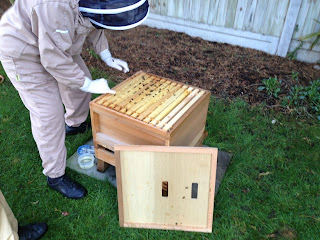Varroa, a parasitic mite associated with honey bees, is a major problem for beekeepers worldwide. When I first started keeping bees I had no idea that this parasite existed and its huge impact. Varroa feeds on body fluids of the honey bee and spreads viruses in the process. This can result in deformities in, for example, the bees wings. This parasite is also thought to play a role in a worrying phenomenon called colony collapse disorder where all the bees in a colony suddenly disappear.
As part of my battle against varroa, recently the hive was treated with oxalic acid. This helps kill the varroa and is best applied at this time of year, as with all varroa treatments, because there are no honey stores so only what needs treatment gets it.
The oxalic acid is drawn up in a syringe and about 5mls is squeezed onto the top of each frame in the brood box. And that’s it – hopefully this’ll strengthen the colony for the spring. All this reminds me of drawing up medications and treating people in my hospital…so many parallels between the bee and real world!


Dear Dr Beekeeper, Putting doctor in your name makes it look like you are an expert in the field of bees, a thing I find a bit misleading. To me P.J. Chandler, the Barefoot Beekeeper has a lot more expertise about bees and a way more rational view about varroa, maybe you and your readers should have a look what he has to say about the mites before influencing others. But then again a western doctor is focussed on fighting symptoms in stead of having a holistic, long-term approach so your title is probably justified after all.
Dear P.J. Chandler,
Thanks for your comments. Dr Beekeeper refers to the fact that I am a medical doctor as well as beekeeper which is in fact true! If you look in the about me section of the website and my blog you will find that I am sharing my experiences and enjoyment as a new beekeeper.
I welcome ideas and experiences from all beekeepers whichever views they might hold. As your comments appear to be referring to your own work we have to be cautious of an element of bias!
Nevertheless, personally I believe that a natural approach is the best wherever possible and that extends to disease generally. Many of the worlds most effective treatments are of course natural. The evidence that a particular treatment works is the most important thing for the ‘western doctor’.
Perhaps you could share here your rational view as to what works best for varroa and the evidence for that?
Best wishes,
Dr Beekeeper